Strictly Personal
Israel is a major player in supporting the continent, By Ambassador Belotsercovsky
Published
1 year agoon
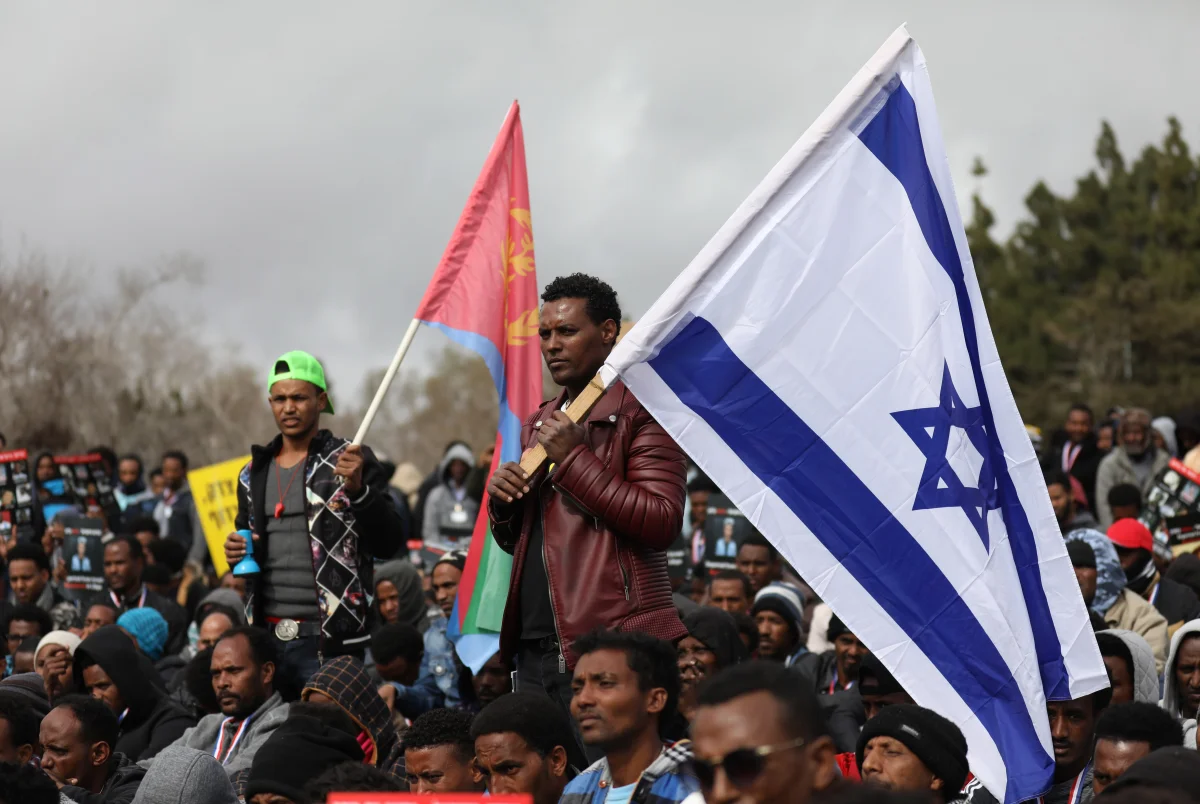
Recent developments regarding the observer status of Israel in the African Union are an opportunity to discuss Israel’s policy towards Africa, particularly Israel’s cooperation with the continent.
Going back in history, Israel has gone through the stages of being a developing country. It learned one major lesson, the key behind the move from the third world to the first is human resources. And like any resource it has to be developed and cultivated. As a result, all the governments of Israel, from the first and on, have invested in education. This investment paid off and from a barren desert, the size of Kruger National Park, Israel became one of the world’s leaders in Science and Technology, Innovation, and creativity.
Despite wars and constant threats to its existence, the small country managed to develop top Universities with eight Nobel Prize Laureates and one of the highest numbers of scientific publications. Israel also hosts more than 300 R&D centres of leading international conglomerates in addition to 7000 start-ups that attracted 25 billion dollars in 2021.
Training and development
The Israel Technical Cooperation Agency, Mashav, was established as early as 1958 with the aim of sharing Israeli knowledge and expertise with developing countries. The main effort was on training and developing of human capital. Up to today, 36 000 experts from various sub-Saharan African countries have been trained in Israel in various courses relating to Food Security, Agriculture, Education, Women Empowerment, Medicine, Public Health and Community development. Some courses were conducted on the spot in Africa by Israeli trainers, and about 31 000 professionals all over the continent benefited from these courses.
Mashav activities are not only limited to training, a significant knowledge transfer also takes place through different projects, mainly in the medical field. Israel provides not only the equipment but also the training and follow-up support. For example, two neonatal units were constructed and equipped in Kumasi, Ghana and local doctors and nurses went to Israel for training.
Intensive care and trauma units were also setup and equipped in Gonakry in Guinea, where teams of Israeli doctors arrived to train the local professionals. Israel renovated and equipped maternity units at the medical centre in Abobo Gane in Ivory Coast. Similar medical projects occurred in Kenya, Liberia, Sierra Leone, Tanzania, Togo, Uganda, Eritrea and Mauritania, among others.
Food security is another area in which Israel shares its expertise with their African friends. Ethiopia benefited from Israeli experience in avocado cultivation. From being a minor crop cultivated by small farmers, it became one of the main Ethiopian agricultural exports. Agricultural equipment and Israeli irrigation systems were installed at the Gambia School of Agriculture.
In Yamoussoukro, Ivory Coast, an agricultural demonstration farm was established, where advanced Israeli irrigation technologies and equipment are utilised. Similar agricultural projects took place in Malawi, Rwanda, Togo, Uganda, Cameroon, Senegal, Burkina Faso and more. Two Israeli agricultural experts based in Nairobi and Lilongwe support and supervise the above-mentioned activity in Africa.
Up against Ebola
Israel has been a major player in supporting the continent in its fight against Ebola. As a recognition of its efforts, the African Union in 2018 officially commended Israel as one of the main contributors to overcoming the pandemic. Mashav was there to provide emergency support in times of trouble, to name a few: water purification units were donated to Madagascar following cyclone devastation and Mozambique following a devastating gas explosion; shipments of medical equipment, including respirators were provided as an emergency response to Benin, South Africa, eSwatini, Uganda, Mauritius, Madagascar and many other African Countries.
Israel also supports and assists various Israeli NGO’s that work all over Africa. One of the examples is “Save a Child’s Heart” an organisation that brings children with severe cardiology impairment, accompanied by their parents, to Israel to receive treatment. This NGO was founded in 1995, and close to 2500 children from Africa have been saved by Israeli doctors to date. More than 140 medical professionals from all over the world have been trained in Israel, many of them from Africa.
Another NGO, “Isra-Aid”, is working at the forefront of responding to major humanitarian crises. Isra-Aid provided urgent daily support to the displaced communities following the devastation created in 2021 by cyclone Eloise in Mozambique’s Sofala Province. Isra-Aid was also on the ground in South Sudan, Ethiopia, Kenya and Tanzania.
Tevel b’Tzedek, an Israeli NGO motivated by the traditional Jewish value of “Tikkun Olam- making the world a better place”. Tevel works in communities in Zambia providing agricultural training, and similar projects were undertaken in Burundi in the past.
Sharing knowledge
Although South Africa is considered a middle-income country, Israel is active in sharing its knowledge and experience here as well. From 1994 to date, approximately 100 South African experts have been trained in Israel, some of whom are currently occupying senior positions in the government.
The focus of Israeli technical cooperation over the years in South Africa has been in the area of food security. Agricultural seminars were presented in the Western Cape, Mpumalanga, Eastern Cape, KZN and Gauteng. Vegetable garden projects were initiated in partnership with Grootbos Foundation in the township of Masakhane Western Cape, including a bio-digester donation.
Water is another important area for cooperation. In 2017 delegates from municipalities across South Africa visited Israel’s water conference, WATEC and were exposed to the latest Israeli technologies regarding recycling municipal water. In 2019 Prof Eilon Adar, one of the leading Israeli water experts, visited South Africa and conducted several seminars.
In 2022 Dr Clive Lipchen, also an Israeli water expert, consulted the city of Tshwane on efficient use of water resources. In addition to government activities, Israeli NGO’s are very active in supporting communities all over the country. To name a few, “Innovation Africa” is one of the leading Israeli NGO’s that have for the last 15 years connected water and electricity to more than four million people all over Africa, using Israeli technology.
More than half a million people in Limpopo and Mpumalanga have access to running water thanks to the work of this NGO. The Jewish National Fund of South Africa, established in South Africa in 1901 with headquarters in Israel, engages in several forestry and education projects in Limpopo, Cape Town and Mamelodi. Joint, a Jewish organisation based in Israel, is concurrently running two food security projects in the Western Cape and Gauteng.
These projects focus on beekeeping and urban agriculture. Israel and Africa have a long-standing relationship which continues to get stronger over the years.
Many African scientific and technological leaders were trained in Israel and Israeli technology is improving the lives of millions across the continent.
Israel and Africa are working together to create a better world. These dynamics are bringing both sides closer to each other for the mutual benefit of our peoples.
– Eliav Belotsercovsky is the Israeli ambassador to South Africa.
You may like
-
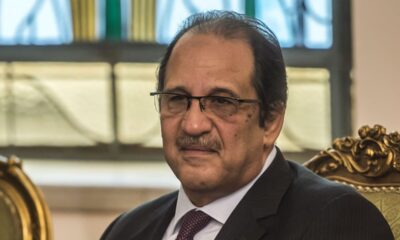

Hamas leader in talks for Gaza ceasefire with Egypt, Qatar
-
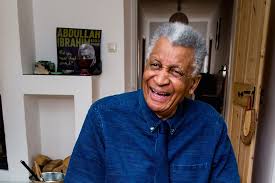

South African Jazz great Abdullah Ibrahim to embark on world tour at age 90
-


This Sudan war is too senseless; time we ended it, By Tee Ngugi
-


S’Africa lengthens troop deployment in Mozambique, Congo DR
-
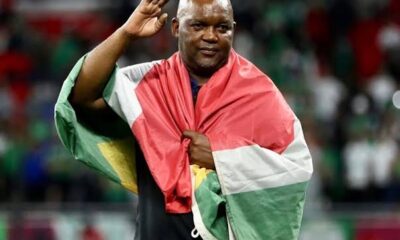

Domestic worker sues Pitso Mosimane, wife following debilitating injuries
-
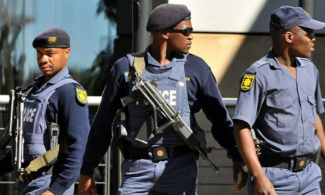

South African police arrest 8 Nigerians following attacks on officers
Strictly Personal
This Sudan war is too senseless; time we ended it, By Tee Ngugi
Published
1 week agoon
April 28, 2024
Why are the Sudanese Armed Forces (SAF) and the paramilitary Rapid Support Forces (RPF) engaged in a vicious struggle? It is not that they have ideological, religious or cultural differences.
Not that people should fight because of these kinds of differences, but we live in a world where social constructions often lead to war and genocide. It is not that either side is fighting to protect democracy. Both sides were instruments of the rapacious dictatorship of Omar el-Bashir, who was overthrown in 2019.
Both are linked to the massacres in Darfur during Bashir’s rule that led to his indictment by the International Criminal Court for crimes against humanity. They both stood by as ordinary, unarmed people took to the streets and forced the removal of the Bashir regime.
None of these entities now fighting to the last Sudanese citizen has any moral authority or constitutional legitimacy to claim power. They both should have been disbanded or fundamentally reformed after the ouster of Bashir.
The SAF and the RSF are fighting to take over power and resources and continue the repression and plunder of the regime they had supported for so long. And, as you can see from news broadcasts, they are both well-versed in violence and plunder.
Since the fighting began in 2023, both sides have been accused of massacres that have left more than 30,000 people dead. Their fighting has displaced close to 10 million people. Their scramble for power has created Sudan’s worst hunger crisis in decades. Millions of refugees have fled into Chad, Ethiopia and South Sudan.
The three countries are dubious places of refuge. Chad is a poor country because of misrule. It also experiences jihadist violence. Ethiopia is still simmering with tensions after a deadly inter-ethnic war.
And South Sudan has never recovered from a deadly ethnic competition for power and resources. African refugees fleeing to countries from which refugees recently fled or continue to flee sums up Africa’s unending crisis of governance.
Africa will continue to suffer these kinds of power struggles, state failure and breakdown of constitutional order until we take strengthening and depersonalising our institutions as a life and death issue. These institutions anchor constitutional order and democratic process.
Strong independent institutions would ensure the continuity of the constitutional order after the president leaves office. As it is, presidents systematically weaken institutions by putting sycophants and incompetent morons in charge. Thus when he leaves office by way of death, ouster or retirement, there is institutional collapse leading to chaos, power struggles and violence. The African Union pretends crises such as the one in Sudan are unfortunate abnormally. However, they are systemic and predictable. Corrupt dictatorships end in chaos and violence.
Tee Ngugi is a Nairobi-based political commentator.
Strictly Personal
Air Peace, capitalism and national interest, By Dakuku Peterside
Published
3 weeks agoon
April 16, 2024
Nigerian corporate influence and that of the West continue to collide. The rationale is straightforward: whereas corporate activity in Europe and America is part of their larger local and foreign policy engagement, privately owned enterprises in Nigeria or commercial interests are not part of Nigeria’s foreign policy ecosystem, neither is there a strong culture of government support for privately owned enterprises’ expansion locally and internationally.
The relationship between Nigerian businesses and foreign policy is important to the national interest. When backing domestic Nigerian companies to compete on a worldwide scale, the government should see it as a lever to drive foreign policy, and national strategic interest, promote trade, enhance national security considerations, and minimize distortion in the domestic market as the foreign airlines were doing, boost GDP, create employment opportunities, and optimize corporate returns for the firms.
Admitted nations do not always interfere directly in their companies’ business and commercial dealings, and there are always exceptions. I can cite two areas of exception: military sales by companies because of their strategic implications and are, therefore, part of foreign and diplomatic policy and processes. The second is where the products or routes of a company have implications for foreign policy. Air Peace falls into the second category in the Lagos – London route.
Two events demonstrate an emerging trend that, if not checked, will disincentivize Nigerian firms from competing in the global marketplace. There are other notable examples, but I am using these two examples because they are very recent and ongoing, and they are typological representations of the need for Nigerian government backing and support for local companies that are playing in a very competitive international market dominated by big foreign companies whose governments are using all forms of foreign policies and diplomacy to support and sustain.
The first is Air Peace. It is the only Nigerian-owned aviation company playing globally and checkmating the dominance of foreign airlines. The most recent advance is the commencement of flights on the Lagos – London route. In Nigeria, foreign airlines are well-established and accustomed to a lack of rivalry, yet a free-market economy depends on the existence of competition. Nigeria has significantly larger airline profits per passenger than other comparable African nations. Insufficient competition has resulted in high ticket costs and poor service quality. It is precisely this jinx that Air Peace is attempting to break.
On March 30, 2024, Air Peace reciprocated the lopsided Bilateral Air Service Agreement, BASA, between Nigeria and the United Kingdom when the local airline began direct flight operations from Lagos to Gatwick Airport in London. This elicited several reactions from foreign airlines backed by their various sovereigns because of their strategic interest. A critical response is the commencement of a price war. Before the Air Peace entry, the price of international flight tickets on the Lagos-London route had soared to as much as N3.5 million for the economy ticket. However, after Air Peace introduced a return economy class ticket priced at N1.2 million, foreign carriers like British Airways, Virgin Atlantic, and Qatar Airways reduced their fares significantly to remain competitive.
In a price war, there is little the government can do. In an open-market competitive situation such as this, our government must not act in a manner that suggests it is antagonistic to foreign players and competitors. There must be an appearance of a level playing field. However, government owes Air Peace protection against foreign competitors backed by their home governments. This is in the overall interest of the Nigerian consumer of goods and services. Competition history in the airspace works where the Consumer Protection Authority in the host country is active. This is almost absent in Nigeria and it is a reason why foreign airlines have been arbitrary in pricing their tickets. Nigerian consumers are often at the mercy of these foreign firms who lack any vista of patriotism and are more inclined to protect the national interest of their governments and countries.
It would not be too much to expect Nigerian companies playing globally to benefit from the protection of the Nigerian government to limit influence peddling by foreign-owned companies. The success of Air Peace should enable a more competitive and sustainable market, allowing domestic players to grow their network and propel Nigeria to the forefront of international aviation.
The second is Proforce, a Nigerian-owned military hardware manufacturing firm active in Rwanda, Chad, Mali, Ghana, Niger, Burkina Faso, and South Sudan. Despite the growing capacity of Proforce in military hardware manufacturing, Nigeria entered two lopsided arrangements with two UAE firms to supply military equipment worth billions of dollars , respectively. Both deals are backed by the UAE government but executed by UAE firms.
These deals on a more extensive web are not unconnected with UAE’s national strategic interest. In pursuit of its strategic national interest, India is pushing Indian firms to supply military equipment to Nigeria. The Nigerian defence equipment market has seen weaker indigenous competitors driven out due to the combination of local manufacturers’ lack of competitive capacity and government patronage of Asian, European, and US firms in the defence equipment manufacturing sector. This is a misnomer and needs to be corrected.
Not only should our government be the primary customer of this firm if its products meet international standards, but it should also support and protect it from the harsh competitive realities of a challenging but strategic market directly linked to our national military procurement ecosystem. The ability to produce military hardware locally is significant to our defence strategy.
This firm and similar companies playing in this strategic defence area must be considered strategic and have a considerable place in Nigeria’s foreign policy calculations. Protecting Nigeria’s interests is the primary reason for our engagement in global diplomacy. The government must deliberately balance national interest with capacity and competence in military hardware purchases. It will not be too much to ask these foreign firms to partner with local companies so we can embed the technology transfer advantages.
Our government must create an environment that enables our local companies to compete globally and ply their trades in various countries. It should be part of the government’s overall economic, strategic growth agenda to identify areas or sectors in which Nigerian companies have a competitive advantage, especially in the sub-region and across Africa and support the companies in these sectors to advance and grow to dominate in the African region with a view to competing globally. Government support in the form of incentives such as competitive grants ,tax credit for consumers ,low-interest capital, patronage, G2G business, operational support, and diplomatic lobbying, amongst others, will alter the competitive landscape. Governments and key government agencies in the west retain the services of lobbying firms in pursuit of its strategic interest.
Nigerian firms’ competitiveness on a global scale can only be enhanced by the support of the Nigerian government. Foreign policy interests should be a key driver of Nigerian trade agreements. How does the Nigerian government support private companies to grow and compete globally? Is it intentionally mapping out growth areas and creating opportunities for Nigerian firms to maximize their potential? Is the government at the domestic level removing bottlenecks and impediments to private company growth, allowing a level playing field for these companies to compete with international companies?
Why is the government patronising foreign firms against local firms if their products are of similar value? Why are Nigerian consumers left to the hands of international companies in some sectors without the government actively supporting the growth of local firms to compete in those sectors? These questions merit honest answers. Nigerian national interest must be the driving factor for our foreign policies, which must cover the private sector, just as is the case with most developed countries. The new global capitalism is not a product of accident or chance; the government has choreographed and shaped it by using foreign policies to support and protect local firms competing globally. Nigeria must learn to do the same to build a strong economy with more jobs.
EDITOR’S PICK
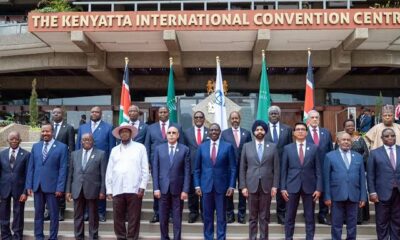

Behind the News: All the backstories to our major news this week
Over the past week, there were many important stories from around the African continent, and we served you some of...


Nigerian retail startup Renda secures $1.9m funding to drive expansion
Nigeria’s retail startup, Renda, has announced securing a $1.9 million pre-seed round of equity and debt funding to enable it...


Burna Boy emerges Africa’s top earning artiste in the US from tours, concerts
Nigerian Afrobeats sensation, Burna Boy, has emerged as the first African artiste to stage the highest-grossing arena concerts and tours...


Nigeria’s 4x400m mixed relay, 4×400 teams qualify for Olympics
Team Nigeria on Sunday morning booked two places at the upcoming Paris Olympics Games in the Mixed 4x400m relay and...


FX bank swaps account for 30% of Nigeria’s external reserves— Fitch
Global credit ratings firm, Fitch, has claimed that approximately 30% of Nigeria’s external reserves is comprised of foreign exchange (FX)...


Nigeria: Civil society group sues 36 govs, Wike over N5.9tn, $4.6bn loans
A civil society organisation in Nigeria, Socio-Economic Rights and Accountability Project (SERAP), has dragged the 36 state governors of the...
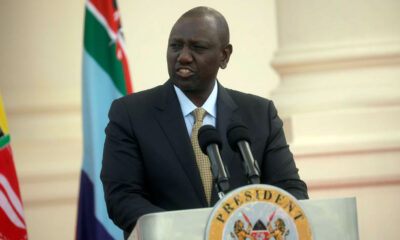

Kenya: President Ruto hints at ‘dire’ weather outlook as Cyclone Hidaya nears
President William Ruto has announced that the severe rains that have been plaguing Kenya for the past several weeks resulting...
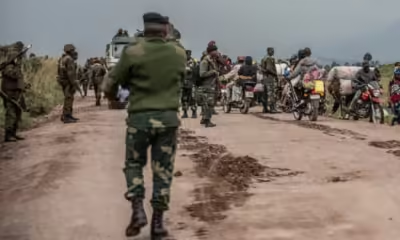

Again, Rwanda denies it attacked displaced persons in DR Congo
For the sixteenth time, Rwanda refuted US charges on Saturday that its troops attacked a camp for internally displaced persons...


Nigeria offers oil majors faster exit if …
Oil-rich West African country, Nigeria, has offered major oil companies, such as Exxon Mobil and Shell, that planned to leave...


Nigeria’s Security Exchange chief to meet foreign, local crypto exchanges, others over crypto regulation
On Monday, local and international cryptocurrency exchanges will meet with Dr. Emomotimi Agama, the recently appointed Director General of the...
Trending
-

 VenturesNow1 day ago
VenturesNow1 day agoNigeria offers oil majors faster exit if …
-

 Sports2 days ago
Sports2 days agoKenyan footballer arrested over brutal robbery, murder case
-
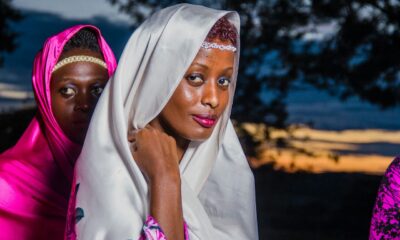
 Culture2 days ago
Culture2 days agoMeet the Ugandan tribe where bride’s aunt must ‘test’ groom’s manhood before marriage
-

 VenturesNow19 hours ago
VenturesNow19 hours agoFX bank swaps account for 30% of Nigeria’s external reserves— Fitch


